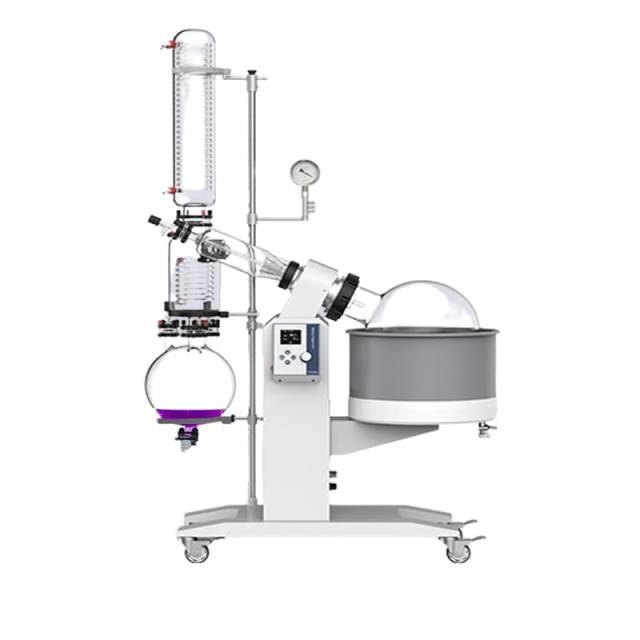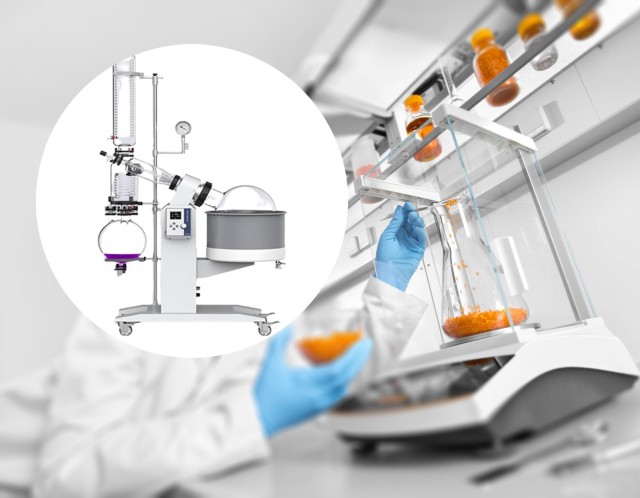Introduction to Rotary Vacuum Evaporators
Rotary vacuum evaporators are essential tools for any laboratory that needs to concentrate or isolate solutions. These devices work by heating a sample under vacuum to increase its surface area and effectively remove solvent. There are different types of rotary evaporators available, each with unique features and benefits. When choosing a rotary evaporator, it is important to consider factors such as vacuum and pump requirements, as well as the desired motor power and capacity. With the right equipment, rotary evaporators can be used in a variety of lab applications, including chemical synthesis, solvent recycling, and product purification.
Table of Contents
- Introduction to Rotary Vacuum Evaporators
- Types of Rotary Evaporators Available
- Considerations for Choosing a Rotary Evaporator
- Vacuum Requirements for Rotary Evaporators
- Pump Requirements for Rotary Evaporators
- Benefits of a Powerful Motor in Rotary Evaporators
- Applications of Rotary Evaporators in the Lab
Types of Rotary Evaporators Available
Rotary vacuum evaporators are available in different types, each designed to meet specific laboratory requirements. Understanding the different types of rotary evaporators available is essential in choosing the right equipment for your lab.
Vertical Condenser Rotary Evaporator
The vertical condenser rotary evaporator has a vertical glass condenser that sits directly above the flask containing the sample. This type of rotary evaporator is ideal for samples that require a lower boiling point.
Horizontal Condenser Rotary Evaporator
The horizontal condenser rotary evaporator comes with a horizontal glass condenser that sits alongside the flask containing the sample. It is recommended for samples that require higher boiling points.
Cold Trap Rotary Evaporator
The cold trap rotary evaporator is designed to prevent vapors from escaping the vacuum system by trapping them in a cold trap before they reach the vacuum pump.
Diagonal Condenser Rotary Evaporator
The diagonal condenser rotary evaporator has a diagonal glass condenser that sits at a 45-degree angle. It is suitable for samples that require a high evaporation rate.
Benchtop Rotary Evaporators
Benchtop rotary evaporators are ideal for labs that are low on space and require an instrument with a small footprint. These instruments can accommodate evaporation of 5 liters or less.
Scale-up Rotary Evaporators
Scale-up rotary evaporators can facilitate 50-100L of evaporation. These rotary evaporators are suitable for larger-scale applications and can be paired with a range of chillers and automation features.
In conclusion, choosing the right rotary vacuum evaporator for your lab depends on the type of sample you are working with and the required evaporation rate. It is essential to understand the different types of rotary evaporators available before making a purchase to ensure that you get the best equipment for your laboratory needs.

Considerations for Choosing a Rotary Evaporator
Choosing the right rotary vacuum evaporator for your laboratory requires careful consideration of various factors. Below are the essential things to keep in mind when selecting a rotary evaporator.
Capacity and Size
The size and capacity of the evaporator are critical considerations when choosing a rotary evaporator. You need to ensure that the equipment can handle the volume of the sample you intend to work with. If you have a small sample size, a mini rotary evaporator could be the ideal choice. However, for large samples, a more significant evaporator with a higher capacity is necessary.
Automation and Ease of Use
The level of automation and ease of use is another crucial factor to consider when choosing a rotary evaporator. Some rotary evaporators come with automated features that enhance accuracy and precision while reducing the risk of human error. You may also want to consider the ease of operation, including the user interface, control panel, and accessibility.
Quality and Durability
The quality and durability of the rotary evaporator are critical factors to consider. You should opt for a high-quality machine made from durable materials that can withstand the rigors of daily use. The quality of the evaporator determines its lifespan and the frequency of maintenance required.
Availability of Replacement Parts and Support Services
The availability of replacement parts and support services is crucial when selecting a rotary evaporator. With frequent use, parts of the equipment are bound to wear out or malfunction. You need to ensure that replacement parts are readily available and that the manufacturer provides reliable customer support.
Specific Applications and Requirements
The specific applications and requirements of your lab are also crucial factors to consider when choosing a rotary evaporator. You should consider the need for specialized features such as temperature control, vacuum regulation, or reflux condenser. The evaporator you choose should have the necessary features to meet the demands of your specific application.
Conclusion
In conclusion, selecting the right rotary evaporator for your lab requires careful consideration of several factors, including capacity, automation, quality, availability of replacement parts, and specific application requirements. By evaluating your needs and priorities, you can choose a reliable machine that can meet your specific requirements and help you achieve your research goals.
Vacuum Requirements for Rotary Evaporators
When it comes to choosing the right rotary vacuum evaporator for your lab, one of the most important factors to consider is the vacuum requirements. The vacuum level required for the evaporation process to occur can depend on several factors, including the solvent being evaporated, the desired evaporation rate, and the sample volume.
Factors Affecting Vacuum Degree of the Rotary Steam System
The key factors affecting the vacuum degree are the vacuum pump power and the system tightness. The vacuum pump should be able to achieve the necessary vacuum level and maintain it throughout the evaporation process. The vacuum value that the system can form is determined by the pressure resistance of the equipment of the rotary evaporator and the avoidance of bumping when the distillation efficiency is ensured. A reasonable vacuum value can be set by adjusting it using the vacuum controller.
Pump Requirements
The vacuum pump used can affect the final product, as some pumps may introduce contamination or alter the sample in other ways. It is important to choose a vacuum pump with excellent chemical and condensate compatibility. An effective gas ballast system can prevent condensation in the pump, and a very good ultimate vacuum is required for low evaporation temperatures or high boiling solvents. An emission condenser for solvent recovery can minimize the impact on environmental and laboratory air. For applications with large amounts of inflammable solvents, pumps and gauges with approval should be used.
Process Requirements
Medium to high vacuum requirements, fast and highly sensitive vacuum control with samples that tend to superheat or foam, and vacuum control for short process times and high reproducibility are important process requirements. Optimum condensation in the cooler of the rotary evaporator and recovery of residual solvent vapors after the pump are also essential.
Rotary Heating Power
The higher the temperature of the oil bath, the faster the distillation rate of the solvent. However, excessively high temperatures can easily lead to the high-temperature softening of seals and other components, reducing their service life and system tightness. The oil bath is typically heated in a water bath with a temperature setting below 60°C, while temperatures above 80°C are heated in an oil bath.
In summary, selecting the right vacuum pump and achieving the optimal vacuum level is critical to the success of the rotary vacuum evaporator process. The vacuum requirements for rotary evaporators can vary greatly depending on the solvent and evaporating temperature. A modern vacuum system includes built-in vacuum regulation to help you reach optimum evaporating rates, shorten the process duration, and minimize environmental and laboratory air pollution.
Pump Requirements for Rotary Evaporators
Rotary vacuum evaporators are widely used in laboratories to create a vacuum inside the system, which is necessary for the evaporation process. The pump is an essential component of the rotary evaporator, which helps to create the vacuum inside the system. When choosing the right pump for your rotary evaporator, it is important to consider the size of your lab and the type of samples you will be working with. Here are the two types of pumps that are commonly used with rotary evaporators:
Oil-Sealed Rotary Vane Pumps
Oil-sealed rotary vane pumps are the most commonly used pumps with rotary evaporators. These pumps are affordable, reliable, and require minimal maintenance. They work by using oil to create a tight seal and lubricate the parts. These pumps perform well in creating a vacuum, and the vacuum pressure can be adjusted according to the requirement. However, these pumps have certain disadvantages:
- They require regular oil top-ups
- They are expensive to run
- They require regular maintenance
- They release some oil mist into the immediate atmosphere (even with oil filter hardware)
Dry Scroll Pumps
Dry scroll pumps are another type of pump that can be used with rotary evaporators. These pumps are more expensive than oil-sealed rotary vane pumps but offer the advantage of being oil-free. This makes them ideal for labs that work with sensitive materials, such as organic solvents. Dry scroll pumps are also low maintenance and have a longer life span than oil-sealed rotary vane pumps. These pumps are suitable for larger labs and labs that work with more complex samples. However, these pumps also have certain disadvantages:
- They are expensive.
- They are sensitive to moisture and dust.
- They require a higher level of technical knowledge to operate.

Factors to Consider
When choosing a pump for your rotary evaporator, you need to consider several factors, including:
Pump Application
The pump application determines the pressure ranges that the system will be required to service. Check out a pressure-range chart to determine pump choices available for your desired range.
Noise Levels
A noisy pump may severely disrupt the quiet working conditions expected in a typical laboratory environment. Therefore, it is important to choose a pump with noise levels that are appropriate for your lab.
Contamination Levels
Some pumps are more likely than others to result in contamination (either in the gases being processed or those being expelled), particularly oil-sealed rotary vane pumps. To avoid these side effects, opt for dry pump systems.
Size, Control, and Footprint
These are three interconnected factors you need to consider when choosing a pump system. A pump unit that is too large will result in an unnecessarily large footprint. Large units are also difficult to control, especially if small, precise flows are required.
Costs
Aside from the initial investment and ongoing energy costs, expect to keep up with several maintenance requirements, including replacing consumables (e.g. oil changes), replacing disposables (e.g. filter elements), and hiring manpower to service the pump.
In conclusion, choosing the right pump for your rotary evaporator is crucial for the evaporation process. By understanding the pump requirements and considering the factors mentioned above, you can select the pump system that is best suited for your lab.

Benefits of a Powerful Motor in Rotary Evaporators
Stable and Consistent Rotation Speed
A powerful motor in a rotary evaporator ensures a stable and consistent rotation speed, which is crucial for effective distillation. The rotation speed should be optimal for the solvent to be removed efficiently and for the sample to be protected from overheating. A powerful motor can maintain the optimal speed, ensuring that the process is completed accurately and quickly.
Ability to Handle Large Volumes
A robust motor in a rotary evaporator can handle large volumes of samples and solvents, making it ideal for high-throughput laboratories. The larger volumes can be processed efficiently and quickly, reducing the time and effort required to complete the distillation process.
Efficient and Productive Workflow
A powerful motor in a rotary evaporator reduces the time and effort required to complete distillation, allowing for more efficient and productive workflow. The faster the process is, the more samples can be processed in a shorter period, leading to increased productivity.
Longevity and Durability of Equipment
A robust motor can withstand continuous use without overheating or breaking down, ensuring the longevity and durability of the equipment. A well-maintained rotary evaporator with a powerful motor can last for many years, making it a wise investment for any laboratory.
In conclusion, choosing a rotary vacuum evaporator with a powerful motor is a wise investment for any laboratory looking to improve their distillation process and increase productivity. A powerful motor ensures a stable and consistent rotation speed, can handle large volumes of samples and solvents, reduces the time and effort required to complete distillation, and ensures the longevity and durability of the equipment.
Applications of Rotary Evaporators in the Lab
Rotary vacuum evaporators are widely used in laboratories due to their versatile applications. They can be used for the following purposes:
1. Sample Preparation for Analysis
Rotary evaporators are used to prepare samples for analysis by removing solvents from liquid mixtures through evaporation and condensation. This is a crucial step in many analytical techniques, including gas chromatography and mass spectrometry.
2. Concentration of Reaction Mixtures
Rotary evaporators are used to concentrate reaction mixtures by removing the solvent from the mixture. This allows for the isolation of the desired product.
3. Purification of Organic Compounds
Rotary evaporators are used for the purification of organic compounds. By removing impurities and excess solvents, the final product can be obtained in a much purer form.
4. Extraction of Volatile Compounds
Rotary evaporators can be used for the extraction of volatile compounds from a variety of sources. This is particularly useful in the food and beverage industry, where flavors and aromas can be extracted from natural sources.
5. Solvent Recovery
Rotary evaporators are used for solvent recovery, which is important in reducing waste and cost in the laboratory. The recovered solvent can be reused in other experiments, reducing the need for new solvents.
6. Purification of Natural Products
Rotary evaporators are used in the purification of natural products, such as plant extracts and essential oils. By removing impurities and excess solvents, the final product can be obtained in a much purer form.
In summary, rotary vacuum evaporators are widely used in laboratories for a variety of applications. They are an essential tool for sample preparation, concentration of reaction mixtures, purification of organic compounds, extraction of volatile compounds, solvent recovery, and purification of natural products. When choosing the right rotary vacuum evaporator for your lab, it is important to consider factors such as the type of samples you will be working with, the volume of solvent, the required evaporation rate, and the level of automation necessary for your experiments.
Related Products
- Laboratory Benchtop Water Circulating Vacuum Pump for Lab Use
- Laboratory Rotary Vane Vacuum Pump for Lab Use
- Laboratory Vertical Water Circulating Vacuum Pump for Lab Use
Related Articles
- A Step-by-Step Guide to Using a Rotary Vacuum Evaporator for Solvent Removal
- Step-by-Step Guide to Operating a Short Path Distillation Apparatus
- How to Choose and Optimize Water Circulating Vacuum Pumps for Your Lab
- Water Circulating Vacuum Pumps: A Practical Guide for Laboratory Applications
- From Chemistry to Cooking The Versatility of Rotary Vacuum Evaporator



